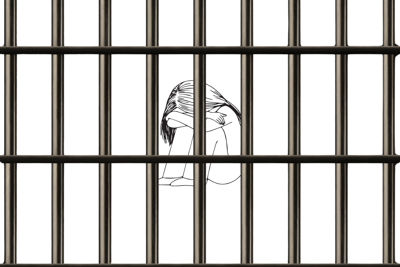
(Canva design by Denise Florez)
As the Trump administration moves to terminate a 28-year-old consent decree governing how immigrant children are detained in federal custody, a hearing will be held Friday in downtown Los Angeles to determine whether to maintain or strike down safeguards provided under the so-called "Flores settlement."
Immigrant-rights groups allege there are ongoing violations of the settlement's protections, including the prolonged detention of migrant children in punitive conditions.
Friday's court hearing will focus on two opposing motions: the government's motion to end the Flores agreement and the plaintiffs' motion to enforce the settlement's terms.
The National Center for Youth Law and co-counsel filed Flores v. Reno in 1985 to address the mistreatment of immigrant children in federal custody.
Approved in 1997, the Flores settlement requires that children be held in licensed, child-appropriate facilities and released to family members or guardians as quickly as possible. Under the terms of the settlement, co-counsel are permitted to visit detention sites where children are being held and hear directly from them about their treatment and the duration of their detention.
The agreement -- overseen by U.S. District Judge Dolly Gee in L.A. federal court -- remains one of the only legal tools to prevent the long-term incarceration of children. Child psychologists have long warned that detention of even two weeks can have severe developmental and health consequences that can last a lifetime, immigrant-rights groups maintain.
The government previously tried to terminate the agreement in 2019, after the Department of Homeland Security and HHS issued a final rule that attempted to dismantle many of the agreement’s protections.
According the American Immigration Council, Judge Gee found that the 2019 regulations “largely defeat[ed]” the purpose of the agreement and blocked them from taking effect. On appeal, the Ninth Circuit ruled that parts of the regulation could go into effect, but the Biden administration ultimately scrapped plans to implement the 2019 rule, leaving Flores in place.
"Our government has shown us time and again it cannot be trusted to protect the rights of children in its custody," said Leecia Welch, deputy litigation director at Children's Rights.
"At this very moment, hundreds of terrified children and families are being held in a family detention facility in Dilley, Texas," Welch said in a recent statement. "Children are having nightmares, loss of appetite, and worsening health conditions. They have little to do, and toys are in short supply. Children are hungry, sleep-deprived, bored, and hopeless. Mothers have to beg for diapers, watch as their children lose weight and deteriorate from the stress, and do much of the parenting alone because fathers are separated at night and much of the day. Flores is the only line of defense between these kids and an administration that wants to lock them up like criminals."
The Justice Department filed its motion in May to dissolve Flores, calling the agreement "ossified" and "intrusive." Federal officials maintain they've regularly updated standards of care for juvenile migrants in order to satisfy Flores' goal of protecting minors in U.S. immigration custody and do not require the oversight of a court located "more than 100 miles from any international border."
The government's motion contends that "continued enforcement of the FSA instead of the policies of the people's representatives is not in the public interest because continued enforcement interferes with the Executive Branch's authority to enforce the immigration laws."
Sergio Perez, executive director of the Santa Ana-based Center for Human Rights and Constitutional Law, has said the "Trump administration is unique in the fact that it has effectively closed down our borders and is choosing to detain children and families for extended periods of time."
Perez argued that migrants are experiencing "horrible conditions where families with young children are being held in facilities not meant to jail individuals, places like airports, regular office buildings, places that don't provide a bare modicum of privacy for families of young children."
In some instances, the migrants are being held in "rooms meant for interrogations and interviews for short stays and they're housing people for weeks."
Perez said the "length of stay for these families and children are lengthening and the conditions that have been detailed to us for these vulnerable folks speak to the emergency situation."
Advocates for the agreement say the percentage of children held for three days or more has quadrupled from 2.4% in May of last year to 10.3% in February of this year. The number of children being held for longer than two weeks has increased sevenfold, they say.
Additional reporting by City News Service.











(0) comments
Welcome to the discussion.
Log In
Keep it Clean. Please avoid obscene, vulgar, lewd, racist or sexually-oriented language.
PLEASE TURN OFF YOUR CAPS LOCK.
Don't Threaten. Threats of harming another person will not be tolerated.
Be Truthful. Don't knowingly lie about anyone or anything.
Be Nice. No racism, sexism or any sort of -ism that is degrading to another person.
Be Proactive. Use the 'Report' link on each comment to let us know of abusive posts.
Share with Us. We'd love to hear eyewitness accounts, the history behind an article.